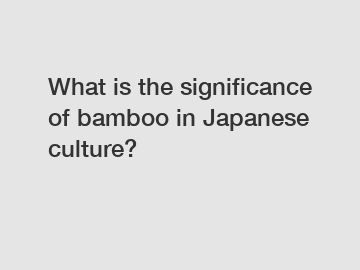What is the significance of bamboo in Japanese culture?
Bamboo, a versatile and revered plant, holds immense significance in Japanese culture. Its profound qualities and qualities are deeply rooted in the country's history, traditions, and way of life. This article will explore the various facets of bamboo's significance, its origins, the process of its significance being established, and the profound impact it has had on Japanese culture.
Bamboo's significance in Japanese culture is multifaceted and far-reaching. Firstly, its remarkable resilience and growth symbolize strength, perseverance, and vitality. Just like bamboo's rapid growth, the Japanese people emphasize continuous improvement and progress. The plant's hollow and flexible nature also serves as a metaphor for humility and an open mind, a quality highly valued in Japanese society.
Furthermore, bamboo has practical uses that have greatly influenced Japanese culture. Its strong and durable stems have been used extensively for construction materials, such as in the creation of houses and traditional tea rooms. Bamboo baskets and utensils are also commonly used in daily life. This practicality, combined with the plant's natural aesthetics, has made bamboo an integral part of Japanese craftsmanship and artistic expression.

The significance of bamboo in Japanese culture can be traced back thousands of years. Shintoism, the indigenous religion of Japan, reveres nature as sacred, and bamboo is considered a vessel for divine spirits. It is often used in various Shinto rituals and ceremonies, symbolizing purity and the connection between the natural and spiritual worlds.
Furthermore, bamboo has been celebrated in traditional Japanese arts, including poetry, painting, and calligraphy. Renowned artists and poets have long incorporated bamboo as a subject in their works, expressing its elegance, simplicity, and grace. Its inclusion in these arts has helped solidify bamboo's significance in Japanese culture, spreading its influence and reinforcing its cultural importance.
Beyond its cultural and artistic significance, bamboo has made a profound impact on Japanese society in practical aspects. Its rapid growth and versatility have contributed to sustainable practices. Bamboo forests act as natural water filters, reduce soil erosion, and provide a habitat for various species. Moreover, bamboo's ability to absorb greenhouse gases and release oxygen makes it a significant contributor to combating environmental issues.
In conclusion, bamboo's significance in Japanese culture is profound and encompasses both spiritual and practical aspects. Its symbolization of strength, resilience, and humility resonates deeply with the Japanese people, shaping their values and way of life. From its historical and cultural origins to its impact on various aspects of Japanese society, bamboo continues to hold immense importance in Japan, making it an integral part of the nation's identity.
Want more information on Dried Bamboo Leaves for New Zealand, Fresh bamboo leaves health benefits, Fresh bamboo leaves prices per pound? Feel free to contact us.
242
0
0

Comments
All Comments (0)